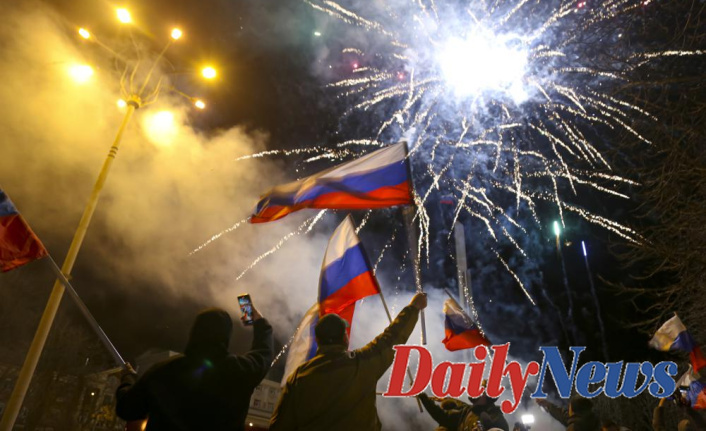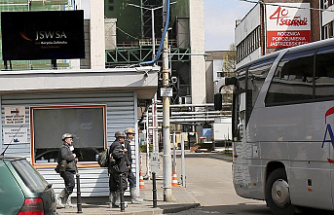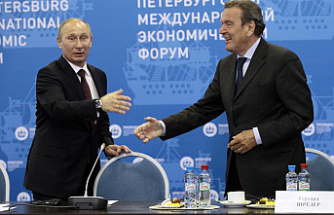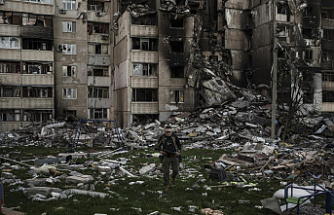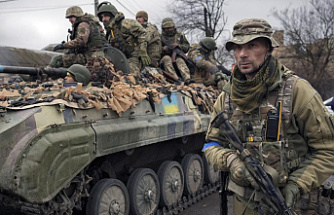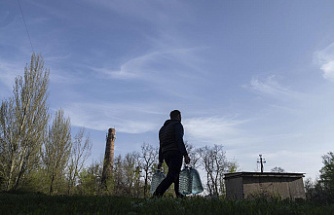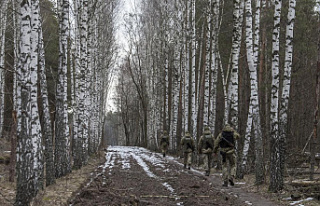He spoke in a chaotic day when Russia seemed to be closer to invasion. President Vladimir Putin recognized separatist areas of eastern Ukraine, and then ordered forces to there.
The U.N. Security Council has called an emergency meeting for Monday night. The U.S. has taken the initiative to impose sanctions.
THIS IS A BREAKING NEWS UPDATE. Below is the original story by AP.
MOSCOW (AP), Monday's emergency meeting of the U.N. Security Council is set for Monday night. This was after Russian President Vladimir Putin acknowledged the independence and mandated that Russian troops "maintain peace" in the eastern Ukraine.
This meeting is requested by Ukraine, the United States, and six other countries. Russia, currently the rotating council president, has set it for 9 p.m. New York Time. Uncertain is whether the meeting would be open to all or closed.
Ukrainian U.N. In a letter to his Russian counterpart, Ambassador Sergiy Kyslytsya states that Kyiv has requested an urgent meeting due to Putin's actions violating Ukraine's sovereignty territorial integrity and the U.N. Charter.
Because Russia is a veto-power, it is almost certain that the Security Council won't take any action or issue any statements.
THIS IS A BREAKING NEWS UPDATE. Below is the original story by AP.
Russian President Vladimir Putin directed Monday's forces to "maintain peaceful" in the separatist areas of eastern Ukraine. This was just hours after the Kremlin had recognized the region's independence. Fears that an invasion might be imminent or already underway were raised by the announcement.
In a Kremlin order, Putin signed, it was not clear when or if troops would enter Ukraine. It brought with it swift promises of new sanctions by the U.S., other Western countries and highlighted the difficult challenges they face in preventing a military conflict that they had portrayed as almost inevitable.
The Kremlin announced this just hours after Putin had, in a lengthy, fact-bending speech on European history, acknowledged the independence of eastern separatist areas. This opened the door to providing them military support, and antagonizing Western leaders, who view such a move as a breaching of the world order.
The U.S. and other countries quickly responded by calling for an emergency meeting at the U.N. Security Council Monday night. The White House issued an executive directive to limit investment and trade in separatist regions. Additional measures, likely sanctions, were to be announced Tuesday. According to a senior administration official, the sanctions are independent from what Washington has prepared in case of invasion by Russia.
These developments occurred amid an increase in eastern region skirmishes that Western powers fear Russia could use to attack the west-looking democracy that defied Moscow’s attempts to bring it back into its orbit.
Putin justification for his decision was a long-reaching prerecorded speech in which he blamed NATO for the current crisis, and called the U.S.-led NATO an existential threat. He analyzed more than 100 years of history to paint today's Ukraine as an inextricably connected modern structure. He claimed that Ukraine had inherited Russia’s historical lands, and was then used by the West to contain Russia after the Soviet collapse.
Putin stated, "I believe it necessary to make a long-overdue determination: To immediately recognize independence and sovereignty of Donetsk People's Republic & Luhansk People's Republic."
He signed decrees recognising the independence of the Donetsk-Luhansk regions eight years after fighting broke out between Russia-backed separatists, Ukrainian forces and other forces. He also asked lawmakers to approve measures that would allow for military support.
Ukraine and the West had accused Russia of supporting separatists until now. However, Moscow denied this accusation, stating that Russians who fought in the conflict were volunteers.
A stream of high-ranking officials supported the recognition of independence of the regions at a previous meeting of Putin’s Security Council. One of the top officials said that he preferred including them in Russian territory, but Putin quickly corrected him.
Russia is a country where many of Putin's worldviews are shared, so recognizing the independence of separatist regions will be popular. Russian state media published images of Donetsk residents launching fireworks, waving Russian flags, and singing Russia's national anthem.
The Ukrainians in Kyiv meanwhile were ecstatic at the news.
"Why should Russia recognize rebel-held areas?" Would you be interested in the opinions of your neighbors if they came to you and said, "This room will become ours." It's your apartment, and it will always be your apartment," Maria Levchyshchyna (48-year-old Ukrainian painter) said. Let them decide what they want. It can, however, provoke a war because ordinary people will fight for their country.
The U.S. warned that Moscow is already planning to invade with an estimated 150,000 Russian troops stationed on the three sides of Ukraine. In a desperate effort to avoid war, Biden & Putin still tentatively agreed to a meeting that was mediated by Emmanuel Macron.
Russia could move in and the meeting would be cancelled. However, the possibility of a face to face summit revived hopes for diplomacy to stop a conflict that could result in massive casualties and enormous economic damage across Europe which is heavily dependent upon Russian energy.
Russia claims it needs Western assurances that NATO will not allow Ukraine and other ex-Soviet countries to join its ranks. Putin stated Monday that even a simple moratorium against Ukraine's accession would not suffice. Moscow also demanded that NATO stop weapons deployments to Ukraine, and pull back its forces in Eastern Europe. These demands were flatly rejected by West.
Macron's office stated that Macron and Macron had "accepted" the principle of such summits, to be followed up by a larger meeting with other "relevant stakeholders" to discuss security in Europe.
Jake Sullivan, the U.S. national security advisor, stated that while the administration is always open to talking to avert a conflict, it was also ready to respond to any attack.
Putin's announcement broke a 2015 Minsk peace agreement that required Ukrainian authorities to grant broad self-rule for rebel areas. This was a major diplomatic coup by Moscow.
Many in Ukraine resented the deal, seeing it as a capitulation and a blow to Ukraine's integrity. Putin and other officials claimed Monday that the Ukrainian authorities are not interested in implementing it.
Since 2014's conflict in the eastern industrial heartland of Russia, just after Moscow annexed Ukraine’s Crimean Peninsula, more than 14,000 people have been killed.
Potential flashpoints increased in number. On Monday, shelling continued along the tension line of contact that separated the opposing forces. Unusually, Russia claimed it had stopped an "incursion from Ukraine" -- something that Ukrainian officials denied. Russia extended military drills in Belarus to protect its capital, Kyiv, and could be used as a staging ground for an attack.
The separatist rebels and Ukraine have been blaming each other for cease-fire violations that resulted in hundreds of explosions per day.
Separatists claim that Ukrainian forces are firing on residential areas. However, Associated Press journalists covering several villages and towns in the territory of Ukraine along the line of contact report no notable escalation by the Ukrainian side. They have seen signs of increased shelling by separatists that has destroyed homes and ripped down roads.
Residents of Donetsk, the main rebel-held capital city, described occasional shelling by Ukrainian forces. However they said that it was not on the same scale as in earlier stages of the conflict.
Separatist authorities Monday claimed that at most four civilians had been killed in the last 24 hours by Ukrainian shelling. Several others were also wounded. According to the Ukrainian military, two soldiers from Ukraine were killed in Ukraine over the weekend and another was injured Monday.
Pavlo Kovalchyuk, a spokesperson for the Ukrainian military, insisted that Ukrainian forces were not returning fire.
In the village of Novognativka on the Ukraine government-controlled side, 60-year-old Ekaterina Evseeva, said the shelling was worse than at the height of fighting early in the conflict.
She said, her voice shaking, "We are at the edge of nervous breakdowns," "And there's nowhere to run."
Another worrying sign was that the Russian military claimed it had killed five "saboteurs" suspected of crossing from Ukraine to Russia's Rostov Region. It also destroyed two armored vehicles, and held a Ukrainian soldier prisoner. Andriy Demchenko, a spokesperson for the Ukrainian Border Guard, dismissed the claim as "disinformation."
The U.S. administration wrote a letter to UN human rights chief, claiming that Moscow had compiled a list containing names of Ukrainians who would be executed or detained in camps following the invasion. The Associated Press obtained the letter, which was first reported in the New York Times.
Dmitry Peskov, a Kremlin spokesperson, said that the claim was false and that no such list exists.

